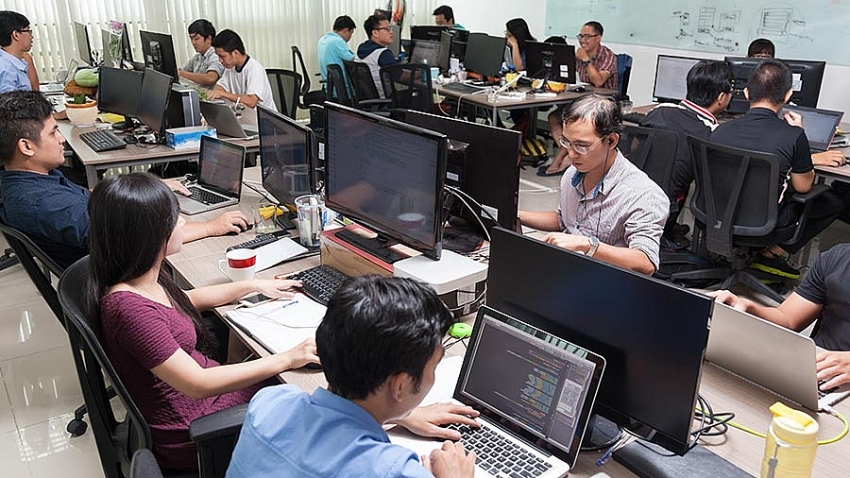ASEAN youth survey: skills over salary
 |
| The ASEAN youth believes skills and continuous education are more important than high wages (Source: ASEAN briefing) |
In a survey of 56,000 ASEAN citizens aged between 15 and 35, some 9 per cent of respondents said their current skills are already outdated, while 52 per cent believe they must “update their skills constantly.” Only 18 per cent believe their current skills will stay relevant for most of their lives.
These concerns about skills are reflected in attitudes to jobs. The ASEAN youth say the No.1 reason they change jobs is to learn new skills – the desire to earn more comes second. 5.7 per cent report having lost a job either because their skills were no longer relevant or because technology had displaced them. Other reasons include the desire to create a more positive social impact and to have a more innovative working environment.
The survey also shows 81 per cent of ASEAN youth believe internships are either equally important or more important than school education. In addition, over half are keen to spend time working overseas in the next three years, probably to gain new skills, with a significant portion wanting to work in another ASEAN country.
“It is impossible to predict how technology will change the future of work,” said Justin Wood, head of Asia-Pacific and member of the Executive Committee of the WEF. “The only certainty is that job markets face accelerating disruption, as the lifespan of many skills is shortening. It is encouraging that ASEAN youths are aware of these challenges and show a deep commitment to lifelong, ongoing learning.”
Overall, the ASEAN youth attach greater importance to soft skills, and less importance to STEM (science, technology, engineering, and maths) skills. They see “creativity and innovation” as the most important skill – in which they also rank themselves highly – followed by the ability to speak multiple languages. They are confident about their soft skills, such as emotional intelligence, and list the two least important skills as “maths and science” and “data analytics”. They are particularly positive about their ability to use technology such as social media platforms, e-commerce sites, and e-payment systems.
Santitarn Sathirathai, group chief economist of Sea, noted, “While it is essential that the region continues to invest in developing STEM skills among young people, we can also see that soft skills will have a vital role to play – even in the tech sector. In a world where knowledge becomes obsolete more quickly, soft skills such as adaptability, leadership, and creativity will be crucial in ensuring young people have the resilience to constantly evolve their skillsets in step with a changing market.”
Responding to the need to train workers in the face of technological change, the ongoing ASEAN Digital Skills Vision 2020 programme, launched by the WEF in Bangkok in November 2018, is assembling a coalition of 16 organisations to train 20 million workers at ASEAN SMEs by 2020, and to provide internship and scholarship opportunities.
“The World Economic Forum’s ASEAN Digital Skills programme is delivering significant impact. In its first eight months, the initiative has already secured commitments to train over 8.9 million workers at SMEs and to provide over 30,000 internships,” said Wood.
Meanwhile, when asked what type of organisation they work for today and where they would like to work in the future, ASEAN youth show a strong preference for entrepreneurial settings. Today, 31 per cent are either entrepreneurs or work for a startup. In the future, 33 per cent want to work in an entrepreneurial setting. 19 per cent of young people also aspire to work for foreign multinationals in the future (the current figure is 9 per cent).
Traditional SMEs (as opposed to startups) are seen less favourably. While SMEs form the backbone of ASEAN labour markets, the survey reveals that small companies face recruitment challenges. 18 per cent of the youth work for SMEs today, but only 8 per cent want to work for an SME in the future. One reason for the low interest is because young people say they receive less training at small companies compared to larger ones.
When asked which industrial sectors are the most attractive, the results reveal a clear preference for the technology sector, with 7 per cent working in the industry today and 16 per cent aspiring to work there in the future. In comparison, more traditional parts of the economy may face recruitment challenges. For example, 15 per cent of youth work in manufacturing today, but only 12 per cent want to work there in the future. Likewise, 8 per cent work as teachers, yet only 5 per cent want to work in education in the future.
What the stars mean:
★ Poor ★ ★ Promising ★★★ Good ★★★★ Very good ★★★★★ Exceptional
Related Contents
Latest News
More News
- VNPAY and NAPAS deepen cooperation on digital payments (February 11, 2026 | 18:21)
- Vietnam financial markets on the rise amid tailwinds (February 11, 2026 | 11:41)
- New tax incentives to benefit startups and SMEs (February 09, 2026 | 17:27)
- VIFC launches aviation finance hub to tap regional market growth (February 06, 2026 | 13:27)
- Vietnam records solid FDI performance in January (February 05, 2026 | 17:11)
- Manufacturing growth remains solid in early 2026 (February 02, 2026 | 15:28)
- EU and Vietnam elevate relations to a comprehensive strategic partnership (January 29, 2026 | 15:22)
- Vietnam to lead trade growth in ASEAN (January 29, 2026 | 15:08)
- Japanese business outlook in Vietnam turns more optimistic (January 28, 2026 | 09:54)
- Foreign leaders extend congratulations to Party General Secretary To Lam (January 25, 2026 | 10:01)

 Tag:
Tag:


























 Mobile Version
Mobile Version